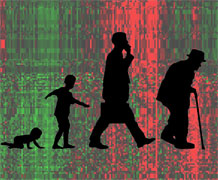
Examination of thousands of genes from nearly 150 human brains shows the circadian rhythm of gene activity changes with aging, according to a first-of-its-kind study conducted by researchers at the University of Pittsburgh School of Medicine. It suggest also that a novel biological clock begins ticking only in the older brain.
A 24hr circadian rhythm controls nearly all brain and body processes, such as the sleep/wake cycle, metabolism, alertness and cognition. These daily activity patterns are regulated by certain genes that are found in almost all cells, but have rarely been studied in the human brain. “Studies have reported that older adults tend to perform complex cognitive tasks better in the morning and get worse through the day,” Dr. McClung said...
Read More









Recent Comments